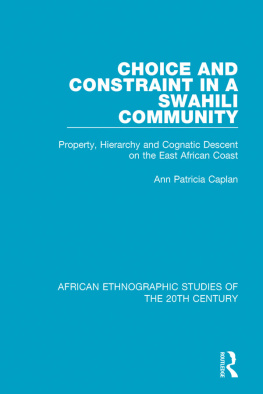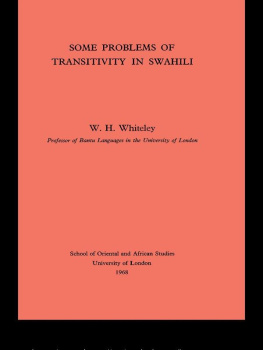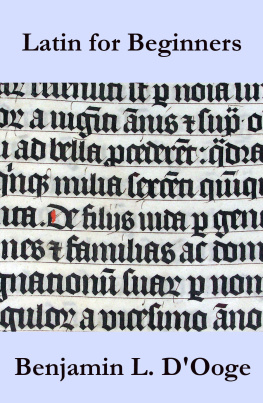
Swahili Made Easy
A BEGINNERS COMPLETE COURSE
Swahili Made Easy
A BEGINNERS COMPLETE COURSE
J.F. Safari


KIMECHAPISHWA NA
Mkuki Na Nyota Publishers Ltd
Nyerere Road, Quality Plaza Building
P. O. BOX. 4246, Dar es Salaam
publish@mkukinanyota.com
www.mkukinanyota.com
Dr. J.F. Safari, 2012
First Published by Tanzania Publishing House.
1972, 1987, 1992, 1996, 2002, 2005
ISBN 978-9987-08-179-0
All rights reserved. No part of this publication may be reproduced, stored in a retrieval system or transmitted in any form or by any means, electronic, mechanical, photocopying, recording, or otherwise except for short quotes properly made for academic and professional references, without the prior permission of the Mkuki na Nyota Pulishers.
CONTENTS
Kiswahili ni lugha ya Afrika Mashariki. Maendeleo ya lugha hii yamekuwa makubwa sana hata kuifanya iwe mojawapo ya lugha maarufu duniani. Licha ya kuwa lugha ya wananchi wa Afrika Mashariki, Kiswahili kinazungumzwa pia katika sehemu kadha za Afrika ya Kati.
Katika sehemu mbalimbali za ulimwengu, watu wengi wameingiwa na msisimko wa kujifunza lugha hii maarufu ya Afrika.
Kwa sababu hii Waswahili wenye uwezo wa kusaidia ufundishaji na ustawishaji wa Kiswahili nje ya eneo lao wanao wajibu mkubwa wa kutoa msaada huo.
Mmojawapo wa misaada muhimu itakiwayo sasa ni vitabu vya Kiswahili vya kuwasaidia wageni wapendao kujifunza lugha hii.
Ingawa viko vitabu vichache vilivyoandikwa kuhusu somo hili, ukweli ni kwamba vingi kati ya hivyo havitoshelezi wala kukidhi haja ya hivi sasa.
Kitabu hiki kilichoandikwa na Dr. Safari ni matokeo ya utafiti na majaribio ya muda mrefu. Majaribio ya kitabu hiki aliyafanya na vikundi mbalimbali vya wageni aliokuwa anawafundisha Kiswahili. Majaribio haya ameyafanya na vikundi vya Wajerumani wakati alipokuwa Ujerumani na wageni kutoka nchi zingine waliokuja kuitumikia Tanzania. Kutokana na utafiti na majaribio yake naweza kusema kuwa kitabu hiki kimetungwa kwa kufuata misingi ya utaalamu wa lugha.
Ingawa majaribio mengi yamefanywa kwa kutumia vikundi vya wageni, hii haina maana kuwa watu wengine hawawezi kufaidika na yaliyomo katika kitabu hiki. Ni matumaini yangu kuwa hata Watanzania na Waafrika wengine wenye ari ya kujifunza Kiswahili watanufaika na kazi hii.
Mwisho, natoa pongezi kwa mwandishi kwa juhudi yake hii na namwombea heri na ufanisi zaidi katika ujenzi, ustawishaji na uenezaji wa lugha hii ya Kiswahili.
G.A. Mhina
Aliyekuwa Mkurugenzi wa
Taasisi ya Uchunguzi wa Kiswahili
Chuo Kikuu cha Dar Es Salaam
Africa has more languages than any other continent. Swahili is one of these languages. It belongs to a group called Bantu. One of the characteristics of the Bantu languages is lack of articles and gender (masculine, feminine, neuter). The nouns in these tongues are grouped into classes by means of their nominal prefixes, e.g. m, wa, ki, and vi, as will become clearer in the course of this study.
The name Swahili is derived from the Arabic word sawahel, which means coasts. Swahili is therefore the language of the people of the coast of East Africa. Although it contains a number of loan words, mostly from Arabic, Swahili is essentially an African language. In the nineteenth century, Bishop Steere of Zanzibar regarded Swahili as a key to the understanding of the culture of East Africa.
His remark was very much to the point, for by learning Swahili one learns at the same time the cultural values of the Swahili-speaking people.
Until now most of the books that are used by adult foreign students of Swahili were written in Europe or America by non-Swahili-speakers. Valuable as these books may be, they tend to be professional and too detailed, so much so that they discourage new learners. The author became aware of this fact when he was teaching Swahili for Beginners in the then West Germany ( 1970 - 73) and in Tanzania (1974 - to date).
This book is, therefore, a result of many years of teaching experience. The author has, with the help of his students (from all walks of life, and from different countries) written this book to meet a real need, the need of a foreign student who is coming in contact with Swahili for the first time.
While avoiding unnecessary details and linguistic technicalities, the book covers all the essential parts of speech of the Swahili language. The exercises have been carefully prepared and tested in class with various groups of students. They are designed to help the students learn correct Swahili by easy and rapid stages.
The book is in two parts. The first part consists of progressive lessons with test exercises. The second part is in form of a story about everyday events in the life of a Swahili family. At the end of each lesson there are comprehension and conversation exercises. It is taken for granted that the student is well prepared to follow Swahili as it is spoken. A certain amount of vocabulary is given at the beginning of each lesson. This, however, is not meant by any means, to be exhaustive. In case one does not understand the meaning of a word used in the text, reference should be made to the vocabulary and the translation provided at the end of the book. Useful phrases are another feature of the second part. They are provided for reference, and should be studied leisurely.
Nouns and verbs are listed in the appendix. The nouns are arranged according to their nominal prefixes, and the verbs are listed alphabetically by their stem forms. It is the sincere hope of the author and all those who helped him in this task that enough guidelines and exercises have been given to enable foreign students not only to acquire knowledge of written Swahili but also to develop a habit of speaking it fluently. Remember: Practice makes perfect.
Attention is drawn to the fact that the Swahili-English and English-Swahili vocabulary contains only words used in the exercises. It follows therefore, that words in the lists of useful phrases should be learnt where and when they appear. The English-Swahili word list is very short due to the fact that exercises in English are few. The experience of the present writer and that of many who have taught Swahili to foreign students confirms the statement that: Swahili is an easy language, its use is widespread, and it may be that there is no language easier to learn. There are no real difficulties of pronunciation, and none of spelling.
The writer, therefore, assures the foreign student of success once he/she begins seriously to learn this beautiful and useful African Language. Although this manual has been especially prepared for use by foreign students, it will no doubt, be found useful also by Swahili-speaking students. General teaching experience proves that what is framed for a special group (in this case, the foreign student) is almost always found useful in the education of other groups as well.
This book lays no claim to being original, or possessing a magical key to easy learning, but it has one claim to make - it has been written by a SwahiIi-speaking author with the help of Swahili students from all over the world (East Africa, Japan, India, China, U.K., U.S.A., France, Italy, Brazil, Egypt, Algeria, Nigeria, Zambia, Ethiopia, Somalia, Burundi, Lesotho, Malawi, Sri Lanka, etc.) who joined the writers course: Swahili for Beginners.
In conclusion, the author would like to express his deep gratitude to all those who helped him to make this book a reality. Special thanks are due to Mr C. Kapinga for his valuable suggestions; to Mr G. Mhina for his encouragement and for writing a foreword to this edition, and last but not least to all his students, who are too many to mention individually by name.
Next page










